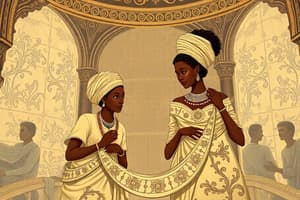Podcast
Questions and Answers
What was the main purpose of the colonial policies implemented in Nigeria?
What was the main purpose of the colonial policies implemented in Nigeria?
- To exploit resources for British economic interests (correct)
- To establish educational institutions
- To promote local governance
- To foster ethnic unity
Which ethnic group is not considered one of the three major groups in Nigeria?
Which ethnic group is not considered one of the three major groups in Nigeria?
- Hausa-Fulani
- Yoruba
- Igbo
- Amhara (correct)
What key event marked the formal end of colonial rule in Nigeria?
What key event marked the formal end of colonial rule in Nigeria?
- The Richards Constitution of 1946
- The Amalgamation of 1914
- The establishment of the Niger Coast Protectorate
- Nigeria's independence on October 1, 1960 (correct)
What was one of the major consequences of Western education in Nigeria?
What was one of the major consequences of Western education in Nigeria?
Which of the following was a nationalist movement in Nigeria during the 1940s and 1950s?
Which of the following was a nationalist movement in Nigeria during the 1940s and 1950s?
What constitutional reform aimed to increase Nigerian participation in government?
What constitutional reform aimed to increase Nigerian participation in government?
Who was the first Prime Minister of independent Nigeria?
Who was the first Prime Minister of independent Nigeria?
What challenge remained significant for Nigeria after gaining independence?
What challenge remained significant for Nigeria after gaining independence?
Flashcards are hidden until you start studying
Study Notes
Historical Context
- Colonial Rule: Nigeria was colonized by Britain in the late 19th century, formalized with the establishment of the Protectorate of Lagos in 1865 and the Niger Coast Protectorate in 1884.
- Amalgamation: In 1914, the Northern and Southern Protectorates were amalgamated to form the Colony and Protectorate of Nigeria, creating administrative unity.
Socio-Political Structure
- Ethnic Diversity: Nigeria is home to over 250 ethnic groups, with major groups including the Hausa-Fulani, Yoruba, and Igbo.
- Traditional Leadership: Pre-colonial governance was organized around traditional kingdoms and empires, like the Oyo Empire, the Kingdom of Benin, and the Sokoto Caliphate.
Economic Factors
- Resource Richness: Nigeria's economy was largely based on agriculture, with palm oil, cocoa, and groundnuts as primary exports.
- Exploitation: Colonial policies exploited resources for British economic interests, leading to discontent among Nigerians.
Education and Nationalism
- Western Education: Introduction of Western education led to a rise in educated elites who began to advocate for political rights and independence.
- Nationalist Movements: Emergence of nationalist movements in the 1940s and 1950s, including the Nigerian Youth Movement and the National Council of Nigeria and the Cameroons (NCNC).
Key Events Leading to Independence
- Constitutional Reforms: The 1946 Richards Constitution and the 1954 Lyttleton Constitution aimed to increase Nigerian participation in government but were met with resistance.
- Political Parties: Formation of political parties like the Action Group (AG) and the Northern Peoples Congress (NPC) intensified political activities.
- Independence Movement: The push for independence gained momentum post-World War II, culminating in the 1954 constitutional conference and a gradual move towards self-governance.
Independence Achieved
- Independence Date: Nigeria gained independence from Britain on October 1, 1960.
- First Prime Minister: Sir Abubakar Tafawa Balewa became Nigeria's first Prime Minister, signifying the end of colonial rule.
Challenges Post-Independence
- Ethnic Tensions: Ethnic divisions remained a significant challenge, leading to political instability.
- Economic Disparities: Unequal distribution of resources and wealth continued to fuel discontent among various regions.
Historical Context
- Nigeria was under British colonial rule beginning in the late 19th century, officially starting with the Protectorate of Lagos in 1865 and the Niger Coast Protectorate in 1884.
- Amalgamation of the Northern and Southern Protectorates in 1914 formed the Colony and Protectorate of Nigeria, aiming for administrative unity.
Socio-Political Structure
- The country features over 250 ethnic groups, with major groups including Hausa-Fulani, Yoruba, and Igbo.
- Pre-colonial governance involved traditional kingdoms and empires, such as the Oyo Empire, the Kingdom of Benin, and the Sokoto Caliphate.
Economic Factors
- Nigeria's economy initially relied heavily on agriculture, with key exports including palm oil, cocoa, and groundnuts.
- Colonial exploitation of resources focused on benefiting British economic interests and fostered resentment among Nigerians.
Education and Nationalism
- The introduction of Western education spurred the emergence of educated elites advocating for political rights and independence.
- Nationalist movements began to develop in the 1940s and 1950s, notably the Nigerian Youth Movement and the National Council of Nigeria and the Cameroons (NCNC).
Key Events Leading to Independence
- The 1946 Richards Constitution and 1954 Lyttleton Constitution attempted to enhance Nigerian governmental participation but faced opposition.
- Formation of political parties, such as the Action Group (AG) and the Northern Peoples Congress (NPC), increased political engagement and competition.
- The independence movement accelerated after World War II, culminating in the 1954 constitutional conference and a shift towards self-governance.
Independence Achieved
- Nigeria achieved independence from Britain on October 1, 1960.
- Sir Abubakar Tafawa Balewa became Nigeria's first Prime Minister, marking an end to colonial governance.
Challenges Post-Independence
- Ethnic tensions persisted as a major obstacle, contributing to ongoing political instability.
- Economic disparities, characterized by unequal resource distribution, continued to ignite discontent among various regions of Nigeria.
Studying That Suits You
Use AI to generate personalized quizzes and flashcards to suit your learning preferences.




